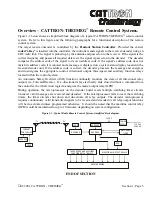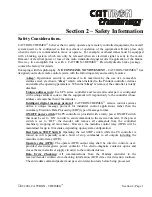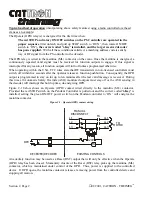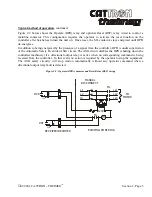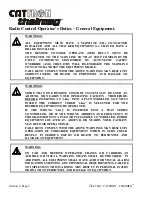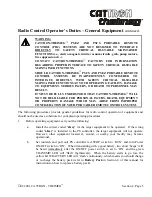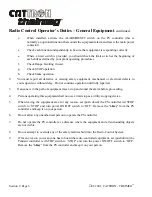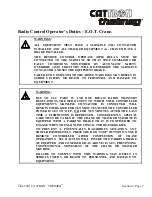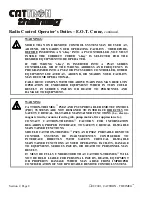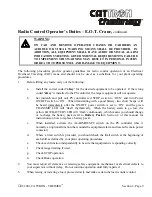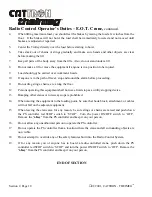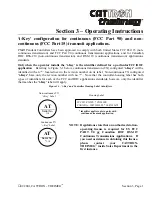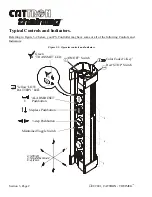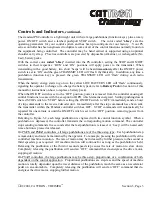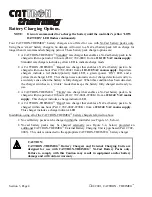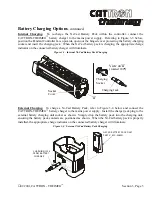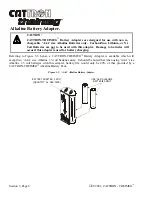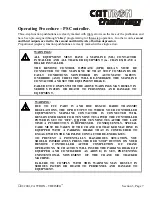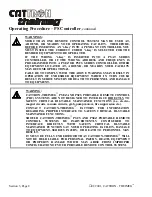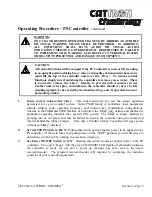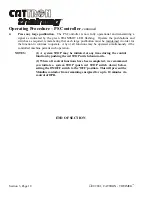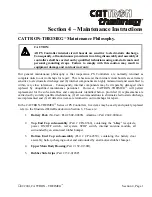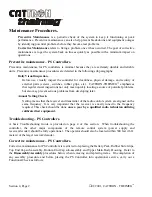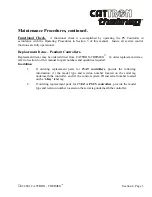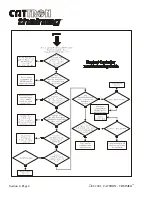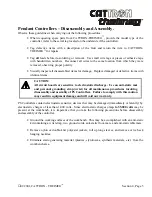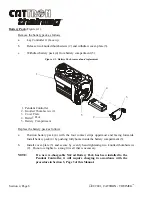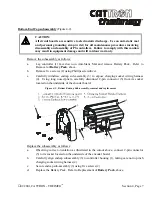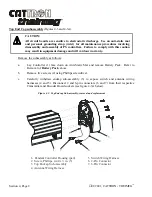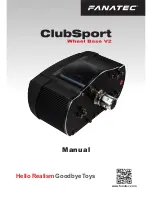
01/2001, CATTRON
- THEIMEG
TM
Section 3, Page 3
Controls and Indicators
, continued.
The standard PS Controller is a lightweight unit with six large pushbuttons (function keys), plus a rotary
power ON/OFF switch and a latched push/pull STOP switch. The color coded
‘i-Key’
sets the
operating parameters for your control system and has been pre-configured at our factory. Your PS
series controller has been engineered to duplicate some or all of the control functions normally found on
the equipment being controlled. The controller may be hand carried or supported using an optional
shoulder carry strap. PS series controllers are powered by disposable (Alkaline), or rechargeable (Ni-
Cad), battery packs.
With the correct color
coded ‘i-Key’
inserted into the PS controller, setting the STOP and ON/OFF
switches to their respective ‘RUN’ and ‘ON’ positions will apply power to the transmitter. When
transmitting with a good battery, two short ‘beeps’ will be heard immediately after the ON/OFF power
switch is set to ‘ON’ and the green TRANSMIT LED will ‘flash’ rhythmically. In addition, any time a
pushbutton (function key) is pressed, the green TRANSMIT LED will ‘flash’ during each radio
transmission.
When the battery energy starts to go low, the yellow LOW BATTERY LED will ‘flash’ continuously,
signaling the operator to change or re-charge the battery pack (refer to
Battery Pack
in Section 4 of this
manual for instructions on how to replace a battery pack).
When the ON/OFF switch is set to the ‘OFF’ position, power is removed from the controller causing all
control functions to cease with the exception of OPR, which remains energized. Setting (pushing down)
the red STOP switch to ‘STOP’ before setting the ON/OFF switch to ‘OFF’ immediately sends a burst
of stop commands to the receiver/decoder unit. Immediately after the stop commands have been sent,
the transmitter within the Pendant controller switches OFF. STOP commands will automatically be
repeated for one minute or until the ON/OFF switch is set to the ‘OFF’ position, removing power from
the controller.
Referring to Figure 3-2, each large pushbutton is engraved with its control function symbol. When a
pushbutton is depressed, the controller transmits the corresponding motion command. The controller
stops sending commands five seconds after the last pushbutton is released. A ‘beep’ will be heard each
time a button is pressed or released.
On PS
CS
and PS
EZ
controllers, all large pushbuttons are of the three-step type. Each pushbutton step
is momentary and must be maintained by the operator. For example, pressing the pushbutton will set the
controlled machine in motion. The rate of motion may be increased by further pressure to the second or
third speed step, as required. All machine motion will continue for as long as the pushbutton is held.
Releasing the pushbutton at the third or second speed step causes the rate of motion to slow down.
Completely releasing the pushbutton will send an ‘OFF’ command that de-energizes the drive motor,
stopping all motion.
On PS
AT
controllers, the large pushbuttons may be three-step, proportional, or a combination of both,
dependant on the control application. Proportional pushbuttons are step-less and the speed of machine
motion is totally dependent upon the travel distance of the pushbutton, much the same as an accelerator
pedal on an automobile. Completely releasing the pushbutton will send an ‘OFF’ command that de-
energizes the drive motor, stopping further motion.
Summary of Contents for i-Key
Page 2: ......
Page 14: ...Page xii 01 2001 CATTRON THEIMEG TM EZ CS AT Rx Rx Tx Tx Tx Rx Rx Rx ...
Page 20: ...Section 1 Page 6 01 2001 CATTRON THEIMEG TM This page intentionally left blank ...
Page 44: ...Section 4 Page 4 01 2001 CATTRON THEIMEG TM ...
Page 52: ...Section 4 Page 12 01 2001 CATTRON THEIMEG TM This page intentionally left blank ...
Page 68: ...Section 5 Page 16 01 2001 CATTRON THEIMEG TM This page intentionally left blank ...
Page 75: ... 01 2001 CATTRON THEIMEG TM Section 6 Page 7 Item 7 Carrying strap shoulder Part 42C 0057 ...
Page 89: ......

